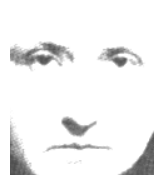Stein and
Grammar

Has anyone else ever ever had this kind of relationship to a mark of punctuation? I myself have always had an intense partisanship toward the colon as a way to introduce an elaboration or an explanation or a clarification, but it can't approach the passion of Gertrude Stein for periods: "Periods have a life of their own a necessity of their own a feeling of their own a time of their own. And that feeling that life that necessity that time can express itself in an infinite variety that is the reason I have always remained true to periods...." Heaven for Gertrude Stein would consist of cherubim and seraphim writing down verbs, prepositions, and articles followed by a firmly placed period --- impossible in real life, but surely possible in heaven, or what's a heaven for? To stand by your favorite mark of punctuation, your favorite part of speech, is the mark of a true fanatic, a fierce grammarista who makes Sister Bernadette look like an amateur...
 Despite her infatuation with grammatical traditions, some of Gertrude Stein's own writing may have been a sly, subversive construction of her own personal grammar --- an impulse that may be akin to her famous statement, "I like a view but I like to sit with my back turned to it." Turning her back on the Sister Bernadettes of the world, she became one of the few writers to construct completely undiagrammable sentences. What would Reed and Kellogg do with (from her novel Lucy Church Amiably) "He made many many tickle them as well as well as withstand"? How would Sister Bernadette tackle (from the play Old and Old) "The grass, the grass is a tall sudden calendar with oats with means, only with cages, only with colors and mounds and little blooms and countless happy eggs to stay away and eat, eat that"?
Despite her infatuation with grammatical traditions, some of Gertrude Stein's own writing may have been a sly, subversive construction of her own personal grammar --- an impulse that may be akin to her famous statement, "I like a view but I like to sit with my back turned to it." Turning her back on the Sister Bernadettes of the world, she became one of the few writers to construct completely undiagrammable sentences. What would Reed and Kellogg do with (from her novel Lucy Church Amiably) "He made many many tickle them as well as well as withstand"? How would Sister Bernadette tackle (from the play Old and Old) "The grass, the grass is a tall sudden calendar with oats with means, only with cages, only with colors and mounds and little blooms and countless happy eggs to stay away and eat, eat that"? It's in "Poetry and Grammar" that Gertrude Stein tells us: "I really do not know that anything has ever been more exciting than diagramming sentences. I suppose other things may be more exciting to others when they are at school but to me undoubtedly when I was at school the really completely exciting thing was diagramming sentences and that has been to me ever since the one thing that has been completely exciting and completely completing." And why? Because when one is diagramming sentences, "one is completely possessing something and incidentally one's self." Gertrude Stein always took it personally. Certainly Sister Bernadette never told us that diagramming sentences would lead to the possession of one's self --- a concept that would have been only dimly comprehensible at my school back in 1955. She just told us that it would be part of our final grade.
Kitty Burns Florey
©2006 Harvest Books